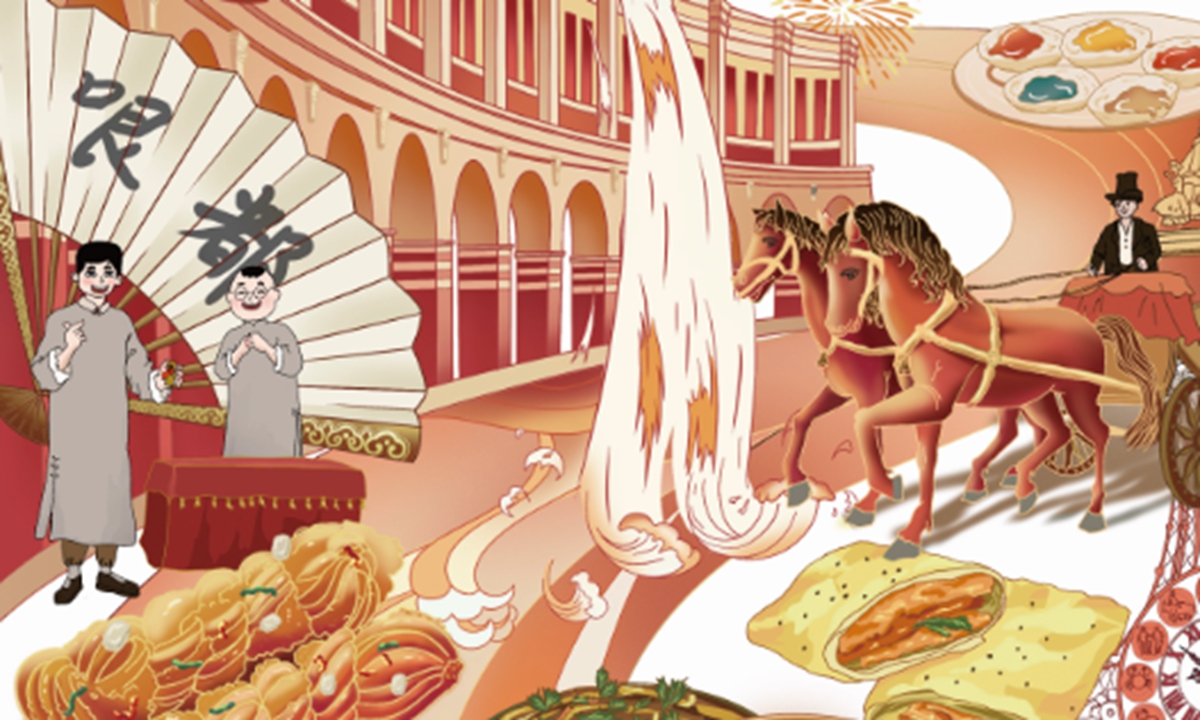MY READING LIFE / STUDENTS' WORKS
Extraordinary tales reveal the spirit of craftsmanship
The character of Tianjin
Editor's Note:
"Read ten thousand books, and your pen will be guided as if by the gods" is an ancient Chinese idiom that can be seen in students' textbooks. China's Ministry of Education has published an action plan to further promote reading among students across the nation. With new and diverse book recommendations, the reading scene is expected to be revived not only at schools, but also across society. To contribute to this endeavor, the Global Times launched "My Reading Life" essay contest for middle school students.
Please pick up a pen and share your stories with us at reading@globaltimes.com.cn
Participants will be rewarded once the article has been selected.

I would recommend 36 Extraordinary Tales of Tianjin written by Feng Jicai as an interesting book full of cultural knowledge. The reason is that this book uses vivid language to engage readers in the story and provides insights into the local customs of Tianjin. The characters in this book live in Tianjin during the late Ming Dynasty (1368-1644) and the early Qing Dynasty (1644-1911). In a 2020 interview, author Feng Jicai stated, "My book aims to express the regional character of Tianjin people and showcase the unique and charming aspects of Tianjin."
What is the character of Tianjin people?
Feng mentioned in an interview in 2020 that Tianjin is a port city where the foreign culture meets Chinese culture. Tianjin people are known to be forthright, loyal, humorous, and, in their fights, rather spirited, although these fights are not taken seriously.
This is the essence of Tianjin people. Additionally, Tianjin people are known for their unique dialect, as seen in the performances of famous comedians such as Ma Sanli and Guo Degang.
The second chapter, "Master Li, the Paint Slinger," impressed me the most. When Li applies the paint, he always wears all black; and when he finishes his work, there is never a single spot of white paint on his body.
He has also set a rule for himself: If there are any white spots on his body, he won't accept payment for his work. Master Li accepts a disciple named Cao Xiaosan. Cao had heard of the master's skill for a long time and was skeptical, but now he could witness it himself.
Painting a roof was particularly challenging, but the master never missed a single point. After finishing the last wall, Master Li sat down, and Cao noticed a small white spot on the master's pants, about the size of a soybean. Afraid of embarrassing his master, Cao didn't speak nor look at it directly, but he couldn't resist stealing another glance.
At that moment, Master Li abruptly turned to him and said, "So, you believe that the master's abilities are fake and his reputation is deceitful, don't you?" Silly boy, take a closer look." With that, Master Li pinched his pants gently, causing the white spot to vanish instantly. But as soon as he released his grip, the white spot reappeared. Master Li then burned it while he was smoking. Observing Cao's terrified and bewildered expression, Master Li smiled and said, "Learn these skills well!"
Reading this story reminds me of a news story I read in October 2023. A video of a cleaner in Beijing's Summer Palace giving a vivid introduction to tourists during his break went viral.
The cleaner, whom many netizens have called "the knowledgeable sweeping monk," used his knowledge to help tourists learn about the Beijing's Summer Palace.
In a follow-up interview, the cleaning staff mentioned that since the day he started his job, he would consult various architectural, historical, and religious information work, and then study them one by one at work.
I believe that both characters Master Li in the book 36 Extraordinary Tales of Tianjin, and the cleaner in Beijing's Summer Palace share a common trait, which is their love, focus, and dedication to their work.
It is evident that the success of a "sweeping monk" does not come from coincidence, but from their passion and concentration.
In this sense, everyone has the opportunity to become a "sweeping monk."
"Read ten thousand books, and your pen will be guided as if by the gods" is an ancient Chinese idiom that can be seen in students' textbooks. China's Ministry of Education has published an action plan to further promote reading among students across the nation. With new and diverse book recommendations, the reading scene is expected to be revived not only at schools, but also across society. To contribute to this endeavor, the Global Times launched "My Reading Life" essay contest for middle school students.
Please pick up a pen and share your stories with us at reading@globaltimes.com.cn
Participants will be rewarded once the article has been selected.

Photo:VCG
I would recommend 36 Extraordinary Tales of Tianjin written by Feng Jicai as an interesting book full of cultural knowledge. The reason is that this book uses vivid language to engage readers in the story and provides insights into the local customs of Tianjin. The characters in this book live in Tianjin during the late Ming Dynasty (1368-1644) and the early Qing Dynasty (1644-1911). In a 2020 interview, author Feng Jicai stated, "My book aims to express the regional character of Tianjin people and showcase the unique and charming aspects of Tianjin."
What is the character of Tianjin people?
Feng mentioned in an interview in 2020 that Tianjin is a port city where the foreign culture meets Chinese culture. Tianjin people are known to be forthright, loyal, humorous, and, in their fights, rather spirited, although these fights are not taken seriously.
This is the essence of Tianjin people. Additionally, Tianjin people are known for their unique dialect, as seen in the performances of famous comedians such as Ma Sanli and Guo Degang.
The second chapter, "Master Li, the Paint Slinger," impressed me the most. When Li applies the paint, he always wears all black; and when he finishes his work, there is never a single spot of white paint on his body.
He has also set a rule for himself: If there are any white spots on his body, he won't accept payment for his work. Master Li accepts a disciple named Cao Xiaosan. Cao had heard of the master's skill for a long time and was skeptical, but now he could witness it himself.
Painting a roof was particularly challenging, but the master never missed a single point. After finishing the last wall, Master Li sat down, and Cao noticed a small white spot on the master's pants, about the size of a soybean. Afraid of embarrassing his master, Cao didn't speak nor look at it directly, but he couldn't resist stealing another glance.
At that moment, Master Li abruptly turned to him and said, "So, you believe that the master's abilities are fake and his reputation is deceitful, don't you?" Silly boy, take a closer look." With that, Master Li pinched his pants gently, causing the white spot to vanish instantly. But as soon as he released his grip, the white spot reappeared. Master Li then burned it while he was smoking. Observing Cao's terrified and bewildered expression, Master Li smiled and said, "Learn these skills well!"
Reading this story reminds me of a news story I read in October 2023. A video of a cleaner in Beijing's Summer Palace giving a vivid introduction to tourists during his break went viral.
The cleaner, whom many netizens have called "the knowledgeable sweeping monk," used his knowledge to help tourists learn about the Beijing's Summer Palace.
In a follow-up interview, the cleaning staff mentioned that since the day he started his job, he would consult various architectural, historical, and religious information work, and then study them one by one at work.
I believe that both characters Master Li in the book 36 Extraordinary Tales of Tianjin, and the cleaner in Beijing's Summer Palace share a common trait, which is their love, focus, and dedication to their work.
It is evident that the success of a "sweeping monk" does not come from coincidence, but from their passion and concentration.
In this sense, everyone has the opportunity to become a "sweeping monk."



